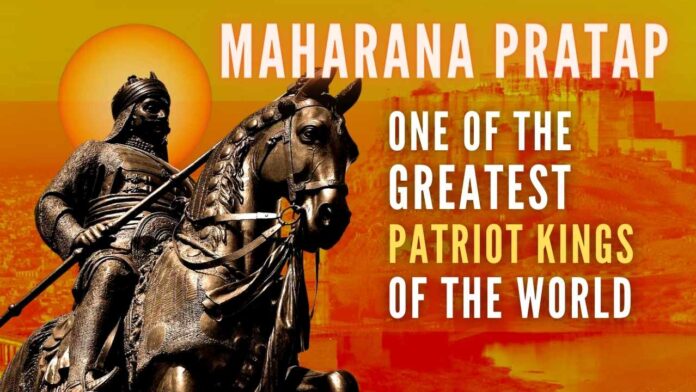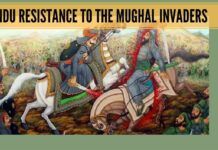
Maharana Pratap, the hero of nationalism
It may seem preposterous when I say that Maharana Pratap ought to be revered a thousand times more than even Chhatrapati Shivaji! But such is the magnificence of the illustrious nature of his personality, character, achievements, and inimitability! He was The Harbinger in bringing the latent patriotism in the Bharatiya people at a time when Hindu temples were being razed to the ground by the Islamic foreign invaders who persecuted Hindus and who were destroying the ancient and immemorial religion of Bharat, which is Hinduism. Maharana Pratap was like the ‘Tremendous Sun’ who melted the ice-cold extremism of the Islamic invasion, which threatened to destroy the ancient Hindu traditions and great culture of the Bharatiya people.
Maharana Pratap was born as Pratap Singh I at Kumbhalgarh in Mewar in Rajputana in erstwhile Akhanda Bharath on the 9th of May 1540 It corresponds to the present day Kumbhal Fort at Rajsamand district in Rajasthan in modern India. He was the son of Rana Udai Singh II and Maharani Jaiwanta Bai belonging to the Sisodia dynasty. The Maharana grew up listening to the stories of Lord Krishna and stories from the Mahabharat. His mother was a great Krishna devotee, and her stories had a great influence on the young Maharana. The stories of the bravery of Rana Sanga and Bappa Rawal also inspired Maharana Pratap. It was in a similar way that the stories narrated by Jija Bai, mother of Chhatrapati Shivaji had on young Shivaji.
Maharana Pratap lived between 1540 C.E. and 1597 C.E. Maharana Pratap became the King of Mewar on the 28th of February 1572. He remained the king of Mewar till his dying day in 1597. Mewar is part of the present-day Rajasthan state in India. Rajasthan has always been renowned for its chivalrous people, who prefer death to loss of honour. Their chivalry is legendary. Maharana Pratap lived up to the famous reputation of Rajput bravery, honour, nobility, and immense fortitude in difficult times. He was a great man with a powerful vision, who lived way ahead of the times he lived in. He lived in treacherous times when the kith and kin within royal families often joined hands with the enemies thereby completely surrendering the well-being of their motherland. But Maharana Pratap was not like that. He knew what he wanted. He knew what others wanted. Yet, he never compromised with his principles and was a sterling example of a patriot, who would not be greedy and who would never betray the interests of his motherland even if he were to be offered the world. Such was the greatness of his courage and tallness of his character that even dumb animals displayed complete confidence and loyalty to him. His loyal horse, ‘Chetak’ served him well till its dying day and saved him from the monstrous Mughals in the battle of Haldighati. His royal elephant, ‘Ram Prasad’ preferred death by fasting in captivity when it was held by Akbar.
The lack of unity amongst the Rajputs made Maharana Pratap like a lion fighting against
wolves. In this, he was like Veera Pandiya Kattabomman of the south of India who stood up against the British, and unlike the Royal Mysore Wodeyar family, which sided with the British imperialists and never fought against the foreign rulers, which is why we must have more like Maharana Pratap, Chhatrapati Shivaji, Veera Pandiya Kattabomans and Lachit Borphukan than Nawabs and Wodeyars who sided with alien invaders like the British. The most important point to be noted is that Maharana Pratap did all this in the 16th century with fewer resources at his disposal.
While Akbar and Maharana Pratap were the greatest opponents, they respected each other. Akbar used marriage alliances and diplomacy alongside war to strengthen his position in Bharat whereas Maharana used his tremendous character and intelligence to protect his small but strategic kingdom of Mewar, which also makes us understand his tremendous intellect, which understood with foresight the strategic value of Mewar for Akbar. Akbar probably wanted Mewar to extend his influence to Gujarat and beyond – also controlling the ports of Gujarat given its proximity to the Arabian Sea trade routes.
The Maharana’s soldiers and people worshipped their magnificent leader. He also never harmed women or children. He was respectful to the womenfolk of even his opponents. Another important point to be noted is his complete lack of greed. He was not an expansionist ruler. He only wanted to protect his land and his people. He wanted peace and progress for his people. He had no great interest in conquering other lands.
Maharana Pratap was a very tall man – both in terms of his actual height and in terms of his personality. He accepted his father’s decision to anoint Jagmal Singh as his successor in the beginning. Jagmal Singh was one of the younger half-brothers of Maharana Pratap. However, when Jagmal Singh did not discharge his duties properly, the people of Mewar asked Prince Pratap to take over as the king of Mewar and he became the 54th ruler of Mewar of the Sisodia Dynasty in 1572.
The time period when Maharana Pratap was ruling over Mewar was the time when the so-called ‘Great Akbar’ was ruling over large parts of India. When the ‘great’ Mughals were busy filling their harems, Maharana was not after sensual pleasures. He was devoted to the welfare of his people and did not succumb to excess lust or greed. He often slept on the grass and under trees and ate uncooked food. Such was the devotion of the illustrious master towards his people and motherland. When most other Rajput kings and other kings from all over Bharat were bowing to the Mughals, this great king of Mewar did not bow before the Islamic invaders and foreign invaders and thus set a great precedent for future Hindu kings like the great Chhatrapati Maharaj.
Maharana’s bravery was so well known that legend says that the great Abraham Lincoln’s mother asked him to bring some sand from the land of Mewar. Indeed, a mere feeling of the land of Mewar blessed and ruled by the tremendous Master, Maharana Pratap is sufficient to make anyone inspired.
Maharana Pratap ruled Mewar for a long time. He ruled Mewar for a very long time both before the famous battle of Haldighati in 1576 and after the Battle of Dewair in 1582. Akbar sent eight diplomatic missions – all with the single goal of making Maharana Pratap give up his little kingdom of Mewar and hand it over to Akbar Badshah. Legend has it that Akbar did everything to entice and coerce the Maharana, but the Maharana never compromised. This included offering half of Bharat in exchange for Mewar. But Maharana Pratap never succumbed to either enticement or greed.
Maharana lived for 57 years. After becoming the ruler of Mewar, there was no turning back. The Maharana did everything to preserve the land, the language, people, and culture of Mewar. Even after his demise, the coins of Mewar bore his name and picture. He never let down his people.
Maharana Pratap’s war techniques of guerrilla warfare must have proved inspirational to future patriot leaders like Shivaji. The greatness of Maharana lay in his astounding abilities as a leader with simple nature. He also read the ground reality and was mature as well. Later patriot leaders like Shivaji were influenced by the principles of the Maharana including non-coercion of women, fight for truth, kindness to animals, loyalty and courage. His life story is unique and unprecedented in history in terms of valour and character. His life story is incredible in the context of medieval Bharat tyrannized by the mighty Mughals. It is especially important given that he never looted any king or its convoys etcetera.
Maharana Pratap served as a great inspiration to thousands of patriots, who wanted to free our motherland from the suzerainty of the alien Islamic sultans. One can be sure of the influence of the Maharana on a young man like Shivaji who was always respectful to women folk even when they belonged to the opponents’ side. There is this legend, which tells us how the Maharana Pratap did not harm his opponent Abdul Rahim Khan-i-Khanan’s women folk. Abdul Rahim had been sent by Akbar to conquer Mewar. Another great aspect about the Maharana was his lack of greed and history has correctly noted that he was not a marauder or looter of the opponents’ treasures. He was neither excessively lustful for women nor greedy for wealth. Does the Maharana need to display any other sign of his greatness?
Maharana Pratap did not accede to the eight diplomatic expeditions sent by Jalal-ud-din Akbar and every time, a diplomatic mission was sent back by Maharana Pratap, he knew that war was coming up. So, he started preparing for war. Akbar also used the same trick used by preceding alien invaders of Bharat and future invaders of Bharat – the policy of divide and rule! Akbar had the Maharana’s own brothers with him as well as other Rajput kings like Man Singh and Todar Mal with him. Imagine the plight of the Maharana surrounded by enemies in the form of kith and kin. He had to not only stand up against the mighty alien invaders – the Mughals but he also had to fight against some of his kith and kin, who had turned into traitors. But that was where the greatness of the character and intelligence of Maharana Pratap shone like a bright light. He did not succumb to greed or to lust or to treachery or to chicanery. He knew time was running out and that battles were inevitable. So, instead of running away from responsibilities for fear of war, Maharana Pratap decided to fight his enemies upfront and that’s how he did it. He met the army of Akbar at a place called Haldighati. The terrain was well known to Maharana Pratap, and he also befriended the Bhil tribe of the hills. The Bhils were very loyal to him. The Maharana had many soldiers, but Akbar’s army was almost 5-fold. But the Maharana made up for the lack of numbers with his unforeseen intensity and determination. He knew the terrain of narrow Haldighati well and his army including the Bhil forces used the Guerrilla warfare technique and massacred the Mughal army of Akbar. The Maharana had gauged beforehand that the narrow mountain pass of Haldighati would not allow the use of cavalry by Akbar.
The decisive Battle of Haldighati was fought on the 18th of June, 1576 between Maharana Pratap’s army and the Mughal army sent by Akbar represented by Raja Man Singh I of Amer. However, just when the Maharana was about to be killed, his loyal horse, Chetak brought him to safety in spite of suffering grievous injuries on its leg. The Maharana did not lose the Battle of Haldighati but did not win it either. The same was the case with Akbar, ‘The Great’. The greatness of Rana Pratap was that he always knew when to fight and when to retreat. He retreated after the Battle of Haldighati only to raise another army to fight against the Mughals. The reasons behind the unprecedented success of the Maharana was his understanding of the terrain of Haldighati, the willpower, the discipline and determination of the Maharana and his soldiers, the local Bhil tribals who were loyal to him and were good in archery and knew guerrilla warfare well, his devotion to his motherland, the uncompromising attitude of the Maharana, the tremendous intelligence of the Maharana especially with knowing when and how to attack and when to retreat, his lack of greed and lust and his ability to keep his senses under control and to go through difficult times with determination, resilience, and perseverance.
The Battle of Dewair took place after the battle of Haldighati. It took place in 1582. This has been recorded by the Britisher, Colonel James Tod. This was a decisive battle between the Maharana’s army and the Mughal forces. The Maharana won the battle. The Mughals stopped trying to take over Mewar. Meanwhile, Akbar had new problems to handle in Punjab, Bihar, Bengal, and the North-west. Maharana soon recovered Chittorgarh, Mandalgarh, Chavand, and other places of importance. Thirty-six Mughal outposts were liquidated in Mewar. Between the Battle of Dewair and his death on the 19th of January of 1597, the Maharana recovered many places including the places to the left of Chittor. The citizens of Mewar who had left Mewar upon Mughals declaring war on Mewar returned to Mewar. The monsoon rainfall was good, agriculture revived and trade in Mewar started improving. Thus, the Maharana was also responsible for the revival of the economy of Mewar.
As a letter by poet, Prithiviraj Rathod reveals, there was only a great leader inspiring hope of freedom for the Rajputs against the mighty Mughals and that was Maharana Pratap.
The Maharana Pratap died of injuries during a hunting expedition at Chavand on the 19th of January 1597. When the news of Maharana’s death reached Akbar, the latter cried and that is why the Maharana has always been both feared and revered. His opponents respected him. One awaits the day when a temple for Maharana Pratap will be built in New Delhi, the capital of modern Bharat to inspire generations of Indians and patriotic people from all parts of the world for aeons to come. It will also teach the lesson that neither greed nor personal ambition is as important as protecting those and that which you love and that loving one’s motherland is the greatest privilege of life. His life was such that even the mighty Mughal, Shehenshah Akbar respected him. His life as a leader and warrior has taught generations that nothing can beat the potent combination of courage and character. Even if one lacks the resources, one’s willpower can get one everything. Maharana Pratap was succeeded by Amar Singh I. Thus, the Maharana realized most of his dreams of taking back Mewar.
One must not forget that Maharana Pratap was a great leader, warrior, patron of Hinduism, a person of sterling character, an epitome of courage and majesty, and who was never greedy, lusty or sinful. He preferred to live and die for his motherland than go after the pursuit of material wealth and luxuries. He constructed the Chamunda Mata temple. A great temple in honour of Maharana Pratap will teach every person in this world to be willing to do anything to protect their nation. It is not the size of one’s nation, that matters but how attached you are to it. He was one of the most perfect kings to have ever existed surpassing the expansionist and greedy kings like Alexander, Ashoka, and Akbar.
Note:
1. Text in Blue points to additional data on the topic.
2. The views expressed here are those of the author and do not necessarily represent or reflect the views of PGurus.
PGurus is now on Telegram. Click here to join our channel and stay updated with all the latest news and views
For all the latest updates, download PGurus App.
- Shaheed Diwas: Remembering Bhagat Singh, Rajguru, Sukhdev on Martyr’s Day - March 23, 2024
- Chhatrapati Shivaji Maharaj – The unparalleled visionary leader - February 19, 2024
- The Constitution Day of Bharat - November 26, 2023











Great article. How many of the Indians know of such great personalities like RP Singh? Thanks to our secular education, successfully brain washed us by teaching barbarians like Tippu, Aourangzeb, Akbar etc, as great rulers
Excellent article. Please keep more coming!